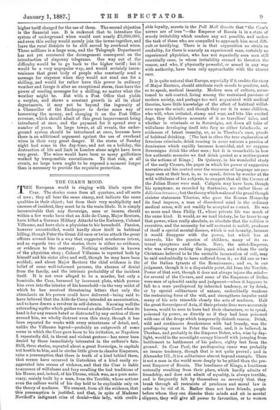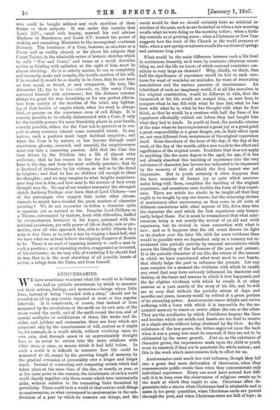THE CZAR'S MOOD.
THE European world is ringing with libels upon the Czar. The stories come from all quarters, and all sorts of men ; they all bear the same stamp, and indicate the same qualities in their object ; but from their very multiplicity and oneness of incident, they must be in the main libels. It is simply inconceivable that any Sovereign, sane or insane, should within a few weeks have shot an Aide-de-Camp, Major Reutern, have killed a German Military Attaché to the Embassy, Colonel Villaume, and have slain a physician to his household. Passion, however uncontrolled, would hardly show itself in habitual killing, though Peter the Great did once or twice attack the great officers around him in a way that suggested murderous intent, and as regards two of the stories, there is either no evidence, or evidence to the contrary. Nothing authentic is known of the physician story ; Colonel Villaume is reported both by himself and his sister alive and well, though he may have been scolded ; and about Major Reutern the chief evidence is the belief of some well-informed persons, the absence of denial from the family, and the intrinsic probability of the incident itself. It is not even alleged to be a murder, but only a homicide, the Czar, harassed by incessant plots, which pursue him even into the interior of his household—in the very midst of which he has received threatening letters that only the attendants on his person could have delivered—being said to have believed that the Aide-de-Camp intended an assassination, and to have drawn a revolver in self-defence. Knowing well the astounding myths which gather round an absolute Court when its head is for any reason hated or distrusted by any section of those around him, we wholly distrust even this story, though it has been repeated for weeks with every minuteness of detail, and, unlike the Villaume legend—probably an outgrowth of some scene in which the Czar gave loose to his irritation, as Napoleon I. repeatedly did, in threat and violent gesture—has never been denied by those immediately interested in the sufferer's fate.
Still, these stories, repeated about a great Sovereign, in capitals not hostile to him, and in circles little given to slander Emperors, raise a presumption that there is truth of a kind behind them, that scenes have occurred in Gatschina of a kind easily ex- aggerated into scenes of violence, and that the Czar is liable to accesses of wilfulness and fury recalling the bad traditions of his House, and, indeed, of his Throne, which was, as a pure auto- cracy, mainly built by a man, Ivan the Terrible, whose actions even the callous world of his day held to be explicable only on the theory of madness. We suspect, from all the evidence, that this presumption is justified, and that, in spite of Madame Novikoff's indignant cries of denial—this lady, with credit-
able loyalty, asserts in the Pall Mall Gazette that "the Czar's nerves are of iron "—the Emperor of Russia is in a state of moody irritability which renders any act possible, and makes the task of those who are compelled to approach him most diffi- cult or terrifying. There is in that supposition no strain on credulity, for there is scarcely an experienced man, certainly no experienced physician, who has not repeatedly seen men still essentially sane, in whom irritability seemed to threaten the reason, and who, if physically powerful, or armed in any way with authority, have been only approachable with the utmost care.
It is quite natural that Europe, especially if it credits the story of Major Reutern, should attribute such moods to positive, and, so to speak, medical insanity. Modern men of culture, accus- tomed to self-control, living among the restrained passions of modern society, and perhaps too well acquainted with medical theories, have little knowledge of the effect of habitual wilful- ness upon the mind ; and though they see it in some children, who will, when irritated, stamp and roar, and bite like excited dogs, they disbelieve accounts of it as travellers' tales, and whether in criminals or in Sovereigns, set down all tales of wilfulness developing itself into fury as either falsehoods, or evidences of latent insanity, or, as in Theebau's case, proofs of habitual drinking. [The last is often the true explanation of ferocious criminals, drink rousing in some natures a passion of dominance which rapidly becomes homicidal, and we suppose Sovereigns drink like other men ; but it is remarkable in how few authentic memoirs we find drink quoted as a motive-power in the actions of Kings.] De Quincey, in his wonderful study of the early Cmsars, the paper in which his power of suggestive narrative and his control over the resources of language are per- haps seen at their best, is, so to speak, driven by wonder at the wild wilfulness of his subjects, to suggest that all the Caesars of the Julian House were mad. Caligula may have been, though his symptoms, as recorded by Suetonius, are rather those of delirium tremens; but the theory which makes of the grand though sinister statesman Tiberius, who gave the Roman Monarchy its final impress, a man of disordered mind in the ordinary medical sense, will not readily be accepted as correct. He was no more mad than Philip II., whose private life was much of the same kind. It would, as we read history, be far truer to say that power, when really absolute, so absolute that the volition is executive, and the necessity for self-restraint is unfelt, produces of itself a special mental disease, which is not insanity, because it would disappear with the power, but which has at intervals, like the passion of children, many of its ex- ternal symptoms and effects. Nero, the artist-Emperor, who was always seeking the impossible, and whom the early Christians believed to be the veritable incarnation of evil, may be said undoubtedly to have suffered from it ; so did one or two of the Italian tyrants of the Renaissance ; and so, in our judgment, though it is a disputable point, did Ivan the Terrible. Power of that sort, though it does not always injure the mind— for several of the Cmsars, and some of the Emperors of Delhi, were men of splendid sanity and judgment—when it happens to fall to a man predisposed by inherited tendency, or by drink, or by special solitariness of nature, undoubtedly weakens the restraining force of the will, and strengthens impulse until many of his acts resemble closely the acts of madmen. Half the great Sovereigns of Asia, if their private lives were accurately known, would be seen to have had their characters, so to speak, poisoned by power, as directly as if they had been poisoned with one of the drugs which temporarily disturb reason. Drink, wild and continuous drunkenness with bad brandy, was the predisposing cause in Peter the Great, and, it is believed, in Theebau, and probably in the Emperor Baber, who, wise by day- light, would in the moonlight occupy himself with jumping from battlement to battlement of his palace, eighty feet from the ground. In Czar Paul, the predisposing cause was probably an insane tendency, though that is not quite proved ; and in Alexander III., it is a solitariness almost beyond example. There is not a man in the world more deeply to be pitied than the pre- sent Emperor of Russia. The loneliness of Kings, a loneliness naturally resulting from their place, which hardly admits of friendship, and does not admit of equality, is always terrible, and is frequently felt by themselves so severely that they break through all restraints of prudence and moral law in order to be rid of it. Bather than not have friends, people before whom they can disrobe their minds and sit in mental slippers, they will give all power to favourites, or to women
who could be bought without any such sacrifices of their States or their subjects. It was under this impulse that Louis XIV., sated with beauty, married his cool adviser Madame de Maiutenon, and Louis XV. trusted the power of making and unmaking Ministries to the incompetent courtesan Dubarry. The loneliness of a Czar, however, as absolute as a Caesar and as swiftly obeyed, so far above his subjects that Count Tolstoi, in the admirable series of historic sketches which he calls " War and Peace," and issues as a novel, describes nobles as fainting with agitation at the sight of him, must be almost shocking. He is so utterly master, he can so completely and instantly make and unmake, the hostile exertion of his will, if he exerted it, would be so deadly in its force, that he can have no true equal, or friend, or easy companion. He may, like Alexander II., try to be bon camerade, or, like many Czars, surround himself with mistresses ; but the distance remains always too great for true friendship, or for any perfect allevia- tion from society of the troubles of the mind, any lighten- ing of that burden of empire which, when his word is always final, so presses on the conscience even of evil Kings. It is scarcely possible to be wholly disinterested with a Czar, if only for the terrible powers his mere friendship places in your hands, scarcely possible, either, for the Czar not to perceive or to sus- pect in every sentence uttered some concealed intent. In any nature, such a position must beget habitual suspicion ; and when the Czar is by nature, or has become through cruel experience, gloomy, reserved, and unsocial, the suspiciousness must rise into a mastering passion. Add that the Czar has been driven by the Nihilists into a life of almost utter seclusion ; that he has reason to fear for his life at every hour in the day, and from the most unlikely quarters ; that he is deprived of intimates by his virtues, as well as by the dread he inspires ; and that he has no children old enough to share his thoughts ; and we may imagine to what heights suspicious- ness may rise in him, and how near to the sources of fury every thought may lie. Do any of our readers remember the strongest sketch Anthony Trollope ever drew, that of Lord Chiltern—one of the personages who suggest that, under other circum- stances, he might have rivalled the great masters of character painting ? We do not remember in fiction a character quite so separate yet so natural as his. Imagine Lord Chiltern on a Throne, surrounded by traitors, beset with difficulties, baffled by circumstances, betrayed in his hopes, poisoned with the national pessimism, yet with power of life or death, ruin or pro- motion, over all who approach him, able to inflict Siberia by a note of two lines, or to order a war by ringing a hand-bell, and we have what we at least believe the reigning Emperor of Russia to be. There is no need of imputing insanity to such a man in such a position ; or of repeating stories, exaggerated or invented, of his outbursts; or, we may add, of wondering if he should find in war, that is, in the most absorbing of all possible bursts of action, a refuge from the Fates, and from himself.















































 Previous page
Previous page